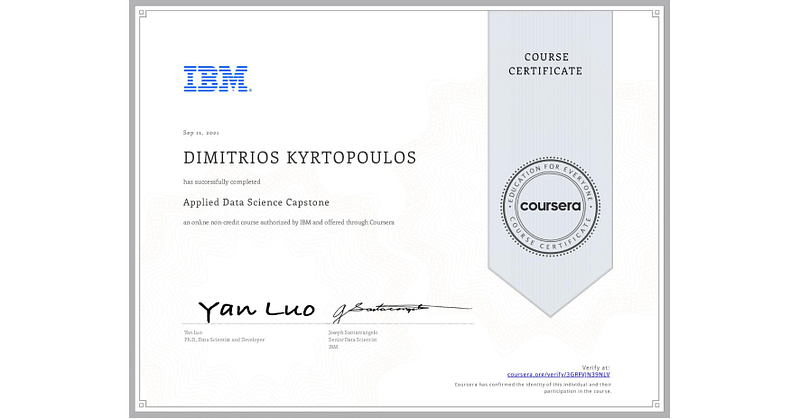IBM Applied Data Science Capstone
Instructors
About this Course
This capstone project course will give you a taste of what data scientists go through in real life when working with real datasets. You will assume the role of a Data Scientist working for a startup intending to compete with SpaceX, and in the process follow the Data Science methodology involving data collection, data wrangling, exploratory data analysis, data visualization, model development, model evaluation, and reporting your results to stakeholders.
You are tasked with predicting if the first stage of the SpaceX Falcon 9 rocket will land successfully. SpaceX advertises Falcon 9 rocket launches on its website, with a cost of 62 million dollars; other providers cost upward of 165 million dollars each, much of the savings is because SpaceX can reuse the first stage.
Therefore if you can accurately predict the likelihood of the first stage rocket landing successfully, you can determine the cost of a launch. With the help of your Data Science findings and models, the competing startup you have been hired by can make more informed bids against SpaceX for a rocket launch.
This course is the final course in the IBM Data Science Professional Certificate as well as the Applied Data Science with Python Specialization. It is expected that you have completed all of the prior courses in the specialization/certificate before starting this one, as it requires the application of the knowledge and skills taught in those courses. In this course, there will not be too much new learning, and instead, the focus will be on hands-on work to demonstrate what you have learned in the previous courses.
What you will learn
Explain the capstone project scenario and a problem that you will solve with location data.
Select a location data provider based on its features.
Demonstrate proficiency by creating a Jupyter Notebook for the capstone project and sharing it for peer review.
Describe the types of location data available in the Foursquare dataset.
Skills you will gain
Data Science
Methodology
Github
Jupyter Notebook
K-Means Clustering
Syllabus
Week 1: Introduction
In this capstone, we will predict if the Falcon 9 first stage will land successfully. SpaceX advertises Falcon 9 rocket launches on its website, with a cost of 62 million dollars; other providers cost upward of 165 million dollars each, much of the savings is because SpaceX can reuse the first stage. Therefore if we can determine if the first stage will land, we can determine the cost of a launch. This information can be used if an alternate company wants to bid against SpaceX for a rocket launch. In this module, you will be provided with an overview of the problem and the tools you need to complete the course.
Week 2: Exploratory Data Analysis (EDA)
In this module, you will collect data on the Falcon 9 first-stage landings. You will use a RESTful API and web scraping. You will also convert the data into a dataframe and then perform some data wrangling.
Week 3: Interactive Visual Analytics and Dashboard
In this module, you will build a dashboard to analyze launch records interactively with Plotly Dash. You will then build an interactive map to analyze the launch site proximity with Folium.
Week 4: Predictive Analysis (Classification)
In this module, you will use machine learning to determine if the first stage of Falcon 9 will land successfully. You will split your data into training data and test data to find the best Hyperparameter for SVM, Classification Trees, and Logistic Regression. Then find the method that performs best using test data.
Week 5: Present Your Data-Driven Insights
In this module, you will compile all of your activities into one place and deliver your data-driven insights to determine if the first stage of Falcon 9 will land successfully.

